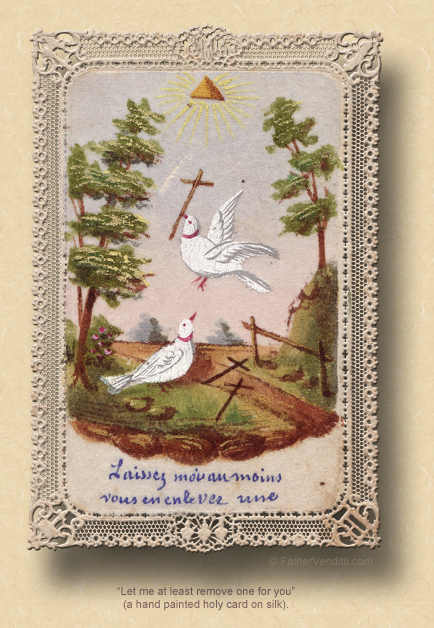The Slow Germination of the Seeds of Kindness.
The Fifth Friday of Lent.*
Lessons from the feria, according to the ordinary form of the Roman Rite:
• Wisdom 2: 1, 12-22.
• Psalm 34: 17-21, 23.
• John 7: 1-2, 10, 25-30.
Lessons from the feria, according to the extraordinary form of the Roman Rite:
• III Kings 17: 17-24.
• [Gradual] Psalm 117: 8-9.
• [Tract] Psalm 102: 10.
• John 11: 1-45.
FatherVenditti.com
|
 6:48 AM 3/16/2018 — I will be reflecting on the Gospel lesson of today’s Mass in conjunction with tomorrow’s, after which I will be speaking to the Sodality after Mass tomorrow, which includes breakfast, so if you want to attend there’s free food, which is why I’m going; so, what I would like to do today is focus a little on our first lesson from the Book of Wisdom, which relates to our Lord's speech about salvation in today’s Gospel lesson, but also relates in a very personal way to many of us. 6:48 AM 3/16/2018 — I will be reflecting on the Gospel lesson of today’s Mass in conjunction with tomorrow’s, after which I will be speaking to the Sodality after Mass tomorrow, which includes breakfast, so if you want to attend there’s free food, which is why I’m going; so, what I would like to do today is focus a little on our first lesson from the Book of Wisdom, which relates to our Lord's speech about salvation in today’s Gospel lesson, but also relates in a very personal way to many of us.
It begins with a line that the Roman Missal translates quite well; better, in fact, than any other translation I can find:
Let us beset the just one, because he is obnoxious to us; he sets himself against our doings, reproaches us for transgressions of the law and charges us with violations of our training (2: 12 RM3).
And if you're any kind of serious Catholic at all, then you have to identify with that at some level: you have to have had the experience of dealing with friends or family members or both who have drifted away from their faith, and with the abuse you can sometimes receive when you try to call them back to the faith in which they were raised. In my last assignment I heard confessions for a couple of hours each day, and it was always a common theme I heard from people all the time: “My son (or my daughter) has stopped going to Church” or “they're living with someone outside of marriage” or whatever; and it's heart-breaking. “I didn't raise them that way.”
Now, the lesson in the Missal skips a number of verses after that opening line, but the whole passage from Wisdom is really quite insightful. The one being quoted here is the person who is being criticized for leaving the faith; so, the passage is putting us in the shoes of the one who's left the faith, and is now being lectured by someone for doing so; and, the passage goes on with him saying to himself:
He professes to have knowledge of God and styles himself a child of the Lord. / To us he is the censure of our thoughts; merely to see him is a hardship for us, / Because his life is not like that of others, and different are his ways. / He judges us debased; he holds aloof from our paths as from things impure. / He calls blest the destiny of the righteous and boasts that God is his Father (v. 13-16 NABRE).
This imaginary speaker who's being quoted is trying to paint a picture of the one calling him back to his faith as someone who is intolerant, self-righteous and rude. I particularly like the way the Roman Missal translates the first verse of today's lesson, when it says, “Let us beset the just one, because he is obnoxious to us….” And if you have ever been in the position of feeling compelled to say something to someone—a friend, a neighbor, a son or daughter—about how they are living, and had the guilt trip thrown back in your face, and made to feel that you're walking that tight-rope between speaking the truth and the sin of pride, you can almost feel the voice of the one you love in this angry quotation from the Book of Wisdom.
Of course, the official interpretation of this passage is that the one being spoken of so angrily is our Lord, because He did call His people back to a life of righteousness and did boast that God is His Father. But there's no reason why we can't see ourselves in it, too, especially when we find ourselves in that heart-breaking situation when someone we love has succumbed to the temptations of the world and thrown off the faith in which they were raised.  And on those occasions when we just couldn't hold back, and risked the sin of pride, and said something because we felt we had a duty to our Lord to do so, and we get that angry response in return, accusing us of being obnoxious, butting in where we're not wanted, sometimes even being pushed out of someone's life entirely: “…merely to see him is a hardship for us,” says this unknown sinner in the Book of Wisdom, “Because his life is not like that of others, and different are his ways” (vs. 14 & 15 NABRE). And on those occasions when we just couldn't hold back, and risked the sin of pride, and said something because we felt we had a duty to our Lord to do so, and we get that angry response in return, accusing us of being obnoxious, butting in where we're not wanted, sometimes even being pushed out of someone's life entirely: “…merely to see him is a hardship for us,” says this unknown sinner in the Book of Wisdom, “Because his life is not like that of others, and different are his ways” (vs. 14 & 15 NABRE).
Why is that? Why is it a hardship for the sinner to even be in the presence of the practicing Catholic? When we confront a friend or relative, a son or daughter, a sibling or a cousin or anyone close to us who has left the faith, and they get angry and accuse us of meddling, and don't speak to us for weeks or months or years, why is that? Because, in the back of his mind, in the deep recesses of his conscience, the sinner always knows he's a sinner. He can convince himself that his sin is not really a sin, that his way of life is just like everyone else’s, because it probably is. And he justifies this rationalization by pointing out what he believes is the hypocrisy of the religious person.
And that's where the lesson as given in the Missal picks up again: “Let us see whether his words be true; let us find out what will happen to him” (v. 17 RM3). And this is where we find ourselves feeling guilty about committing the sin of pride, because we know our sins: we examine our consciences, we go to confession, we know we're far from perfect. We end up questioning our right to even say anything. This is especially true if the soul of the one we're concerned about is our own child, because then we're torn between what we believe is our obligation as a parent, and the reality of our own sins and imperfections. “Should I say something or shouldn't I?” We don't know what to do.
For those of us who love our Lord there will always be people in our lives who won't measure up. The family that prays together doesn't always stay together, and even children raised in the best of homes can go astray. How we respond to them can either push them farther away or it can draw them back. Maybe not right away … maybe a simple seed of kindness and understanding we plant now won't take root and bare fruit until long after we're dead. There's no rule in life that we're entitled to see the results of the good we do. But that doesn't mean we shouldn't do it.

* Because Lent began on a Wednesday, today is the fifth Friday. Cf. the post here under the heading "Hey, aren't you off by a week?" for an explanation of how the days of the liturgical calendar are rendered on this site as opposed to how they are designated in the Roman Missal.
|

